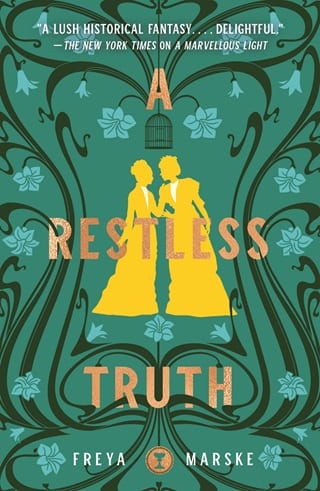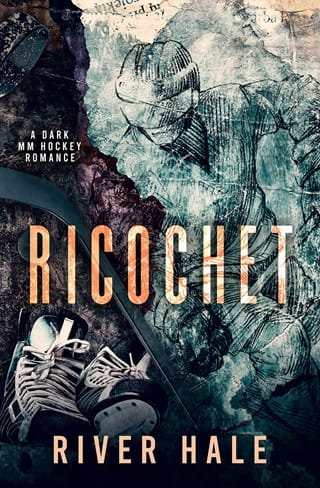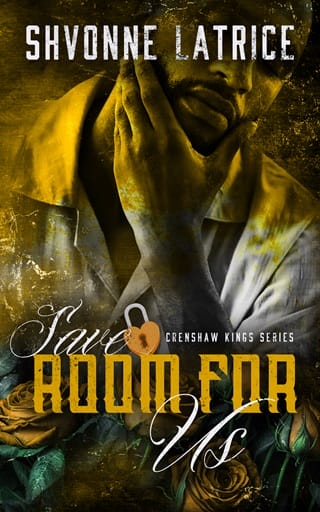Chapter 23
23
There were two nights and just over two days remaining before they came into Southampton. Maud’s liminal ship was proving double-edged. The contract piece had to be somewhere aboard, and their enemies couldn’t disappear into the mist and the waves; but Maud’s people were stuck aboard, too, in a place packed full of non-magicians. No magic could be done unless it was private or invisible.
Which was why Maud was currently attending the Lyric ’s main entertainment and was not allowed to spend the day screaming into her pillows or lying despairingly in her bath until her fingers wrinkled.
A carnival had been erected on the sun deck. Bunting of coloured flags hung between anything vertical and anything hook-shaped, and small stalls sold food or crafts or games of chance. A man did sketches for a few shillings apiece. The string quartet played lively tunes, and the cellist scowled whenever the wind tried to fling his pegged sheet music off the stand.
It was extraordinarily gusty. Stall canvas bulged between securely fastened corners and the flags snapped and danced on their strings. Clouds scudded as if pursued, and the grey ocean fretted with foam atop every swell. Men and women paused to clutch at their hats or adjust the pins that held them in place, and at least one young girl had already burst into tears when her parasol leapt from her hands and spun away lost, high and quick as a kite.
It seemed the worst possible weather for the sport of badminton.
But a Tournament of Badminton had been on the posted schedule of attractions, and clearly nobody had engaged the initiative that would have been required to move it into one of the enclosed promenades. So Maud and Violet stood on the deck—close but not touching, prominently idle—and waited their turn.
Today, Lord Hawthorn would create a small diversion by going to the master-at-arms and asking to have a precious personal item transferred to the ship’s safe. It could muddy the waters, at least. Help preserve the illusion that they did know what the cup was, and had it safe in their possession.
Ross, as the only one who could still act without being potentially watched by Chapman and Morris and anyone else on their side, had been charged with tracking down Dorian’s water bowl.
Maud had wanted allies. She hadn’t wanted covert troops who would do all the interesting things while she stood around and tried to keep her best yes-I- am -enjoying-the-party smile from slipping off her face. How did real military generals stand it without churning their nerves into restless butter?
And most generals probably weren’t stuck with a bodyguard-companion in the form of someone they’d fucked, argued ferociously with, fucked again, and now existed with in a tense, insulted silence.
Not that Violet looked tense. Violet was performing the scandalous Miss Debenham as beautifully as ever. She flirted with any man who came close, from the swaggering groups of youths to the elderly men promenading with stately wives on their arms.
A sparsely bearded blond boy stopped in response to Violet’s smiles and, after greeting them in accented English, regaled the two of them with an earnest, incomprehensible monologue in a language that sounded like German and French muddled together and spoken through silk. He pressed Violet’s hand, practically clipped his heels as he bowed over it, and wandered off in the direction of the stall selling fruit punch.
“Goodness,” murmured Violet, “do you think I just passed up the opportunity to become a tsarina?”
She turned to Maud, but Maud hadn’t been ready for her cue to play along. The sparkling look in Violet’s eyes, inviting her in on the joke, was quenched in the length of Maud’s hesitation and died above Violet’s smile, which remained pinned in place.
Maud, belatedly, forced herself to smile in return. She could do this. She wrenched together memories of every interminable evening she’d ever spent in a room full of too many people, watching Lady Blyth fool them all into believing that she was a warm-hearted fountain of charity and generosity and social conscience instead of a gorgeous, selfish creature who wore whatever face suited her at the time.
“ What, ” said Mrs. Navenby, “ is the matter with you girls today? ”
Maud managed not to reach up to where the sunflower locket lay beneath her shirtwaist. Panic slid its hand into hers. She didn’t know the rules of being a medium. The ghost inhabited her body, her mouth—could it see her thoughts ?
No. Mrs. Navenby wasn’t the sort to ask a question if she already knew the answer.
Maud and Violet exchanged a semi-truce of a look, containing their complete agreement that there were certain things not to be discussed in front of the necklace.
“We had a disagreement,” said Maud.
“I’d say we’re still having it, wouldn’t you, Maud, my dear?”
To disagree would be to lie. Maud neither stuck out her tongue nor told Violet to go jump over the side. She turned to the current game of badminton and applauded a point instead. Rose Bernard and Diana Yu were demolishing their opposition: an elegant redheaded woman and a young man with an untidy moustache, who were far too busy gazing besottedly at each other to have their attention on the game. The word honeymooners seemed designed expressly for them.
Maud’s lips tingled, but the ghost decided not to comment further on Maud and Violet’s tension.
The hell with it. They couldn’t afford to be at odds; there was too much at stake. Both of them had made a mess of things last night, but Violet was clearly too bloody-minded to admit it and apologise. Maud would have to bend first. The very necessity of it made her more annoyed.
“I’m sorry,” she said stiffly. “I’m sorry for— telling you what you wanted and felt, instead of listening to you. I know how it feels to have someone trample over you when you’re trying to tell them what you want. And yet… it seems I’m a naturally trampling sort of person.”
There was nothing in that to specify exactly what kind of argument was had, or how few items of clothing were being worn during said argument. Violet gave her a startled look, as though an apology were akin to Maud having handed her a small rabbit or a spiked plant in a pot.
“Thank you,” Violet said eventually.
“Your motivations have always been self-centred, and you’ve never lied to me about that. You’ve never pretended to be in this for anything more than intrigue and boredom.”
Hmm. The apology had leapt a hedge and was racing off cross-country. Before Maud could yanks on its reins, Violet narrowed her eyes.
“You have a real trick for beating people around the head with the truth like it’s an umbrella, did you know that?”
Maud nodded.
A matching apology failed to materialise. But frustration was bleeding through Violet’s mask now. Violet’s cruelty last night had hurt, yes. Maud was still certain that she preferred this narrow-eyed, snappish, honest version of Violet Debenham.
“The most annoying thing,” said Violet, low under the noise of the wind and crowd, “is not actually the trampling. It’s that you act as though you occupy some enormous moral high ground, when you’re just as self-centred as I am. Britain’s magicians don’t need you to be their champion. It’s not your fight. And you’re going on about the misuse of power and acting all self-righteous, but you’re in this to prove yourself to your brother. And to have an adventure.”
Heat gathered in Maud’s nose. But—Violet might not be causing deliberate harm this time. Violet might be giving her the truth she wanted.
She let Violet’s words settle into her, and breathed past their sharp corners.
“Can’t it be both?” she said. “No—I do—I think you’re right. About me. Robin’s always been the unselfish one, he’s always let me think only of what I want, and that’s why… it’s my turn to try, for him.” Truth. No matter its awkward shape. “He’s the only person who loves me. Maybe the only person who ever has.”
Half of Violet’s mouth pulled into a small, amused expression. “Oh, I absolutely refuse to believe that.”
There. When the sparkle slipped there was a wall behind it, and when that slipped, there was this: a glimpse of a bright, funny, affectionate person who was just as real as the sharp-tongued Violet, only disguised more heavily. Maud was sure of it. It was tugging her in two directions like ropes at her wrists. Part of her still swam with horror that she was so attracted to someone who was what she’d always sworn to avoid: a two-faced, beautiful liar.
The opposite-tugging part of Maud knew she couldn’t control how she felt; it wasn’t in her nature. As a girl she’d been happy to give all of her love to her brother. Then delighted, when her last and best governess, Miss Lyons, arrived in her life, to find that she had a whole new armful of love to give, as though it had been waiting patiently under dustcloths in an attic somewhere. And she’d loved Liza Sinclair the same: each helping of love just as huge and easy as the last.
We’ve known each other three days, Violet had said. It was true. And they’d only just begun to learn where they kept the ugly corners of their personalities. Violet wanted Maud to stay at a safe distance. Maud should be worldly and carefree about it all.
But everyone Maud had loved, she’d loved at once, on instinct. Greedily. Violet Debenham was selfish and secretive and difficult to know, and vibrant and artistic and bold, and Maud was allowed to tumble into unwise love as long as she stared clear-eyed at the finish line.
Six days on a ship wasn’t nothing. So it might hurt at the end. Maud would drink her fill for now.
“It’s us,” said Violet, stepping forward.
The Misses Yu and Bernard were taking a breather; they retreated in triumph to the refreshment stalls. Maud and Violet were handed their racquets and installed behind the net, and a pair of young men installed opposite them.
“Miss Cutler,” said one of their opponents. “Miss Debenham.”
The locket around Maud’s neck shuddered and burned over her ribs.
“Mr. Chapman.” Violet tapped the racquet against her palm. “What an unexpected pleasure. If you were hoping to have things all your own way, I’m afraid we will disappoint you.”
Chapman smiled at them through the net. There was nothing sinister about him, even now, but Maud remembered the way he’d sneered at Hawthorn and addressed Maud and Violet as if they were foolish children. There was more than one way to treat people like things.
“There’s no place for chivalry in sports of this nature,” he said. “I intend to win. And I don’t believe you’ll pose me any real difficulties in the end.”
“I say,” said his partner disapprovingly. “No need to get bloodthirsty over a bit of fun, is there? Name’s Simmons,” he added to Maud and Violet. “Didn’t realise everyone else was already acquainted.”
Simmons had a bony face and the sort of lanky frame that one mentally dressed in cricket whites. Maud dimpled at him out of sheer gratitude that he didn’t appear to be another horrible magician, and introduced herself and Violet.
The match seemed likely to fall in favour of the gentlemen, at first. Simmons’s reach compensated for his awkwardness, and Chapman played with sharp focus. Violet was tall enough to lunge for tricky shots. Maud was the weakest player, and had to keep reminding herself that this was just something to pass the time and keep Chapman occupied and guessing, not a metaphor for their more figurative fight. She could lose a match to him. It wouldn’t mean anything.
Maud hated losing.
So did Violet, it seemed. Poor Simmons looked steadily more discomfited at the violence with which Violet and Chapman attacked the shuttlecock.
The first game was at fifteen-twenty when Maud finally got off a rather good shot, scooped up from low and aimed squarely at the net’s far corner. The shuttlecock sailed in a promising arc—and then gave a hiccup, as if poked midair with a finger, and hit the tape. It fell to the deck.
“Rotten luck—that was going to make it. Blast this wind.” Simmons offered Maud an encouraging smile.
“Yes, indeed,” said Chapman.
Violet retrieved the shuttlecock. When she handed it to Maud to serve, the feathers had bent with the force of her grip, and her smile was rigid as she directed it through the net at Chapman. She’d shifted her racquet grip to free up most of her fingers.
“Violet,” hissed Maud, before Violet could move back to her own position.
“He’s cheating, ” Violet hissed back.
“He’s trying to make you cause a scene.”
Violet laughed loudly, as if Maud had said something witty, and patted her on the arm. She kept her voice low. “I’ve used magic for eighteen of my twenty-three years, Maud. I can pull off a few spells in front of the unbusheled and leave them none the wiser.”
The small flame of caution in Maud was roundly outvoted by the part of her that wanted to see Arthur Chapman trampled, and a girlish part that pointed out that Violet was seeking vengeance in a tournament on Maud’s behalf, like a medieval knight.
Yet another part thought, startled: she’s only four years older than I am.
Violet tucked the racquet under her arm and bent as if adjusting her bootlaces, her hands hidden by the curtain of her skirt.
“Are your fingers cramping, Miss Debenham? Perhaps you should forfeit the game.”
“How thoughtful of you, Mr. Chapman,” said Violet, honey-dripping. “Maud, my dear, why don’t you serve?”
God only knew what any weather-watchers would have thought was going on in this corner of the deck, if they tried to track the effect of the wind. Shots went high, wide, too fast, and too slow. Violet and Chapman found any excuse to free their hands: dropping things, adjusting clothing, claiming that their fingers were cramping with the effort, and they’d just take a moment to stretch them. Even so: unless one knew what cradling was and how it looked, it would just appear to be a bafflingly chaotic match.
A game went to the ladies; a game to the gentlemen. The final game nearly went to twenty-all, but Maud found herself tripping over nothing as she lunged, and took a tumble that cost them the match. She climbed to her feet with a sigh.
“Well played,” announced the steward in tones that suggested he wasn’t sure it had been. “Victors to play on.”
Maud exchanged an apologetic look with Simmons as they shook hands beneath the net. She offered her palm gamely to Chapman.
Pain like a cluster of needles sank deep into the flesh of her hand as he shook.
Maud bit her gasp in half as it emerged. She tried to pull away. Chapman’s hand was tight around hers. What was she going to do, his taunting eyebrows asked—make a scene ?
She felt cold all over when he released her. She linked her arm through Violet’s before Violet could be subjected to anything similar, and chattered inanely about the food stalls, tugging Violet across the deck. Maud’s skin didn’t stop crawling until she’d tugged off her glove and assured herself that her palm was free of blood or black marks promising further pain. Just a warning, then. Just to bring home the message that Chapman had power and Maud did not.
Violet bought them cones of shaved ice with fruit syrups ladled over. Maud stared at the large white block as the man chipped away at it and thought, with a whirl of unreality, of Mrs. Navenby’s corpse.
Whatever was in the ice room wasn’t Mrs. Navenby, really. Mrs. Navenby was the voice and the anger and the will, haunting the sunflower locket and dwelling unseen within the animated creature that was Maud. She had no idea how to think about a soul . She’d have to ask Edwin about it.
“Chapman’s—oh, he’s still in the tournament,” she said, as they stood with spoons and cones and watched the occasional soar of white feathers and red rubber above the heads of the intervening crowd.
“Yes, the bastard didn’t think that one through,” said Violet with satisfaction. “He’s stuck there for another match at least. Unless he plays at rolling his ankle and limping off, but I’d say he’s the wrong sort of man to think of that. Wouldn’t want to look weak.”
“ You made me trip to lose the match. Not him.”
Violet smiled beatifically. “I haven’t been in a charm-flinging quarrel since—” She closed her mouth. Looked down at her ice. Then looked at Maud, with something between defiance and caution.
Maud held her breath. Would she finally hear something about Violet’s family life? Much as she longed to hear about the games that magical siblings might play, she’d have settled for even an anecdote about playing badminton in the garden. Anything that was true.
But Violet said, abruptly, “You’re scared of failure.”
Maud lowered the spoonful of ice before it met her lips. “I’m not afraid to lose a badminton match, Violet, and I can see it was—”
“No, listen. You said that I know what you fear. I do. And I can see that it makes things—unbalanced.” Violet’s chest rose and fell, once. Decisive. “I’m scared of the sight of blood. I hate it. Even a small cut makes me queasy, and in larger amounts…” She made a face.
“Oh.” It was a small offering, but it was something. Maud managed not to blurt out What about your monthlies? “I suppose that’s not uncommon.”
“Why did I choose lemon? This looks like street-side snow that someone’s pissed in,” said Violet, wandering New York–ward in tone. She took a spoonful of her yellowish ice and swallowed it pensively. “I didn’t mind blood for most of my life, really. But then I killed someone.”
Maud fumbled her cone and it fell to the deck.
Rather unfortunately, she’d chosen raspberry syrup. The resultant mess resembled, well, a gruesome amount of blood.
But Violet laughed and bought her another, then asked a steward to send someone with a mop. She and Maud retreated to a pair of deck chairs. Chapman would be able to watch them all he wanted, once he was done with his game. Treats in hand, they sat.
“ Killed someone? ” said Maud at once. The roof of her mouth felt odd, like a sea cave throwing back echoes. Either it was the numbing effect of the ice, or Mrs. Navenby had decided to chime in with the exact same question.
Violet spooned a larger amount of lemon ice into her mouth. Robin did that at meals when he didn’t want to answer questions. Maud waited, murmuring over the spattering of raspberry-blood on the hem of her own skirt. “Don’t even think about it,” she said, when Violet tried for a second spoonful. “Talk.”
Violet talked. She told Maud about the night when a man had followed her home from the theatre, in the cool small hours of the night, and she’d slipped into an alley to get rid of him and ended up trapped there when he drew a knife and came at her.
“The thing about a real knife,” said Violet, “is you can use it to threaten people, to see if they’ll back off. But a knife-spell’s only purpose is to cut. I only had time to cradle one spell. If I’d gambled on an illusion, I’d have been helpless if he called my bluff. So.” She looked as if she might be about to say something else, but swallowed, hard. Her eyes had gone distant, her cheeks ashen.
“It’s all right,” said Maud quickly. “You don’t have to tell me the details. It sounds like it was awful.”
“For a moment it felt good . Bright and good.” Violet made a fist over her lower sternum. “Like the part of me that’s just anger was finally allowed out, was allowed to be . And then I realised I had killed a man and he could have been anyone, and I didn’t have my family and my birth to protect me. I was just another music-hall girl. Standing in a stinking alley, covered in blood.” Her voice faltered. “I had to magic the stuff out of my clothes. It took half the night because my hands wouldn’t stop shaking and ruining the cradles.”
Her brittle tone hit Maud like the crack of a cane. This wasn’t a penny dreadful or a grisly tale from the Illustrated Police News . This had actually happened, to the person sitting next to Maud right now. Violet had sounded so cheerful about her life in New York—among magician-artists! On the stage! Creating beautiful illusions and sleeping with whomever she pleased!
Sparkle. Distraction.
Maud had asked her for something true. She wasn’t going to prove herself too naive to handle it.
“Anyhow. It’s hardly a tragedy for the ages. I don’t like blood. That’s why.”
Maud opened her mouth to thank Violet for telling her, then closed it. She’d been owed something. Violet had paid.
She finally ate more of her raspberry ice, letting the sweetness spill over her tongue. She kept eating, spoon after spoon, until she’d forced the question And why are you so scared of telling the truth? back down her throat.
“Will you tell me more about Lady Enid?” she asked instead. There: the midlands between intimate secrets and impersonal stories. “She sounded like a true character.”
“She was.” Violet smiled sidelong. “You should visit, once everything’s sorted out with the estate, and I’ll show you some of the musical instruments in the house. She and Mr. Taverner created a viola that produced taste-illusions, though they could never get it to do anything but apricots or Stilton.”
That was the first time Violet had expressed any kind of desire to continue their friendship past the voyage. A warm sensation fuzzed between Maud’s ribs.
Oh. That was the sensation of the ghost rising.
“Lady Enid? Taverner? Are you talking of Enid Blackwood?”
“That’s right, ma’am,” said Violet. “She was a cousin of mine. Did you know her?”
“ Did? Was? ” A ringing pause. “ Do you mean to tell me that Enid is deceased? ”
“Yes,” said Violet slowly. “Lady Enid’s death is the reason I’m on this ship.”
“ Enid Blackwood, ” said Mrs. Navenby, “ is—was—oh, damnation .” The word splintered in Maud’s mouth. “ She was the third keeper of the Last Contract. Which means that all three of us are now dead .”
 Fullepub
Fullepub 



